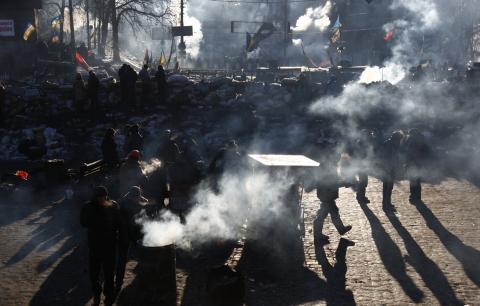Advertisement
Ukraine President Signs Amnesty Into Law, Currency Slumps On Crisis
KIEV (Reuters) - Ukraine's embattled President Viktor Yanukovich on Friday signed into law an amnesty for demonstrators detained during mass unrest and repealed anti-protest legislation, in a fresh bid to take the heat out of the political crisis.
But the move by Yanukovich, who remains politically active despite going on sick leave on Thursday, was not likely to be enough to end the sometimes violent anti-government protests on the streets of Kiev and beyond.
Many protesters rejected the amnesty outright, because it is conditional on occupied buildings being cleared of activists, and a radical Ukrainian nationalist group behind much of the violence pressed new tough demands on Friday.
The 63-year-old leader, who looks increasingly isolated in a tug-of-war between the West and Ukraine's former Soviet overlord Russia, suddenly withdrew from view on Thursday, complaining of a high temperature and acute respiratory ailment.
He has been under pressure since November, when his decision to accept a $15 billion loan package from Russia instead of signing a trade deal with Europe infuriated many of his compatriots and sparked huge protests in the capital.
At least six people have been killed and hundreds more injured in street battles between anti-government demonstrators and police, which have escalated sharply after the authorities toughened their response.
The crisis forced Prime Minister Mykola Azarov to resign, and as yet there is no sign of a successor. Serhiy Arbuzov, Azarov's first deputy and a close family friend of Yanukovich, has stepped in as interim prime minister.
Underlining its economic leverage over Ukraine, Moscow says a new government must be in place before it goes ahead with a planned purchase of $2 billion of Ukrainian government bonds.
That reluctance, and the turmoil more generally, contributed to a 2.5 percent fall in the value of the hryvnia currency against the dollar on Friday to its lowest level for 4-1/2 years.
KERRY TO MEET OPPOSITION
U.S. Secretary of State John Kerry plans to meet opposition leaders, including boxer-turned-politician Vitaly Klitschko, on the sidelines of a security conference in Munich on Friday.
"Our message to Ukraine's opposition will be the full support of President Obama and of the American people for their efforts," Kerry said in Berlin on Friday before the meetings.
"But we will also say to them that if you get that reform agenda... we would urge them to engage in that because further standoff, or further violence that becomes uncontrollable, is not in anybody's interests."
Kerry also called on Russia to keep its distance.
"We would ... say to our friends in Russia this does not have to be a zero (sum) game, this is not something where Ukraine should become a proxy and trapped in some kind of larger ambition for Russia or the United States."
With opposition leaders away in Munich and freezing night temperatures gripping the capital, protest organizers have not called for a big rally on Sunday, when the biggest demonstrations tend to be held on Kiev's Independence Square.
Some protesters sleep in tents and warm themselves from wood-fuelled braziers through the night, but many hundreds also sleep on the floors of occupied public buildings including Kiev's City Hall.
An anti-government activist who vanished a week ago appeared on television on Friday, his face badly beaten and with wounds to his hands, saying he was kidnapped and tortured by his abductors who had "crucified" him.
Dmytro Bulatov, 35, who was one of the leaders of anti-government protest motorcades called 'Automaidan', was taken to hospital after he appeared on Ukrainian television.
"They crucified me. They punctured my hands," he said, pointing to marks on the backs of his hands. "They cut off my ear, slashed my face," he said. "But I am alive, thank God."
The United Nations' human rights office called for an investigation into reports of kidnappings and torture, and European Union foreign policy chief Catherine Ashton said she was appalled by signs of torture inflicted on Bulatov.
"All such acts are unacceptable and must immediately be stopped," she said in a statement.
A far-right nationalist group called Right Sector, seen as being behind violent clashes with police in Kiev, meanwhile demanded the release of activists held by police, threatening to take the law into their own hands to free their comrades.
"If they (police) refuse, appropriate steps will be to taken to free these people and not only constitutional methods will be used," Right Sector leader Dmytro Yarosh told reporters.
Right Sector, a paramilitary group whose violent actions have appalled opposition leaders and peaceful protesters, also said it wanted to play a direct role in any negotiations for a settlement between Yanukovich and opposition leaders, he said.
The defense ministry, which has emphasized its neutrality throughout the unrest, urged the president to move swiftly, and within the law, to end the crisis.
"The military and the Ukrainian armed forces ...called on the supreme commander to take immediate steps, within the framework of the law, to stabilize the situation in the country and reach agreement with society," it said in a statement.
NATO Secretary General Anders Fogh Rasmussen said on Twitter that he was following developments in Kiev with concern, and that the "military must remain neutral".
(Additional reporting by Pavel Polityuk and Natalia Zinets in Kiev, Michelle Martin and Gareth Jones in Berlin and Adrian Croft in Brussels; Writing by Mike Collett-White; Editing by Jon Boyle)



















Add new comment